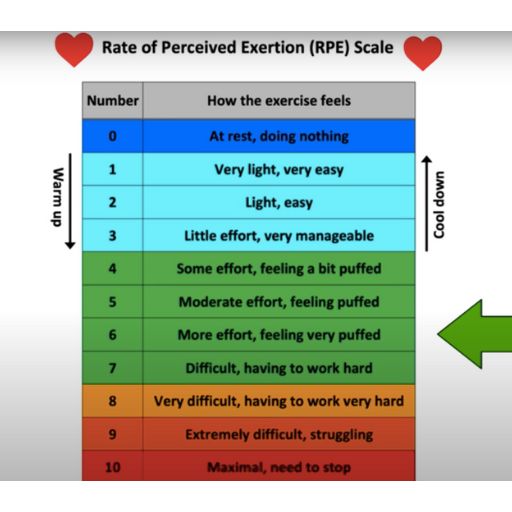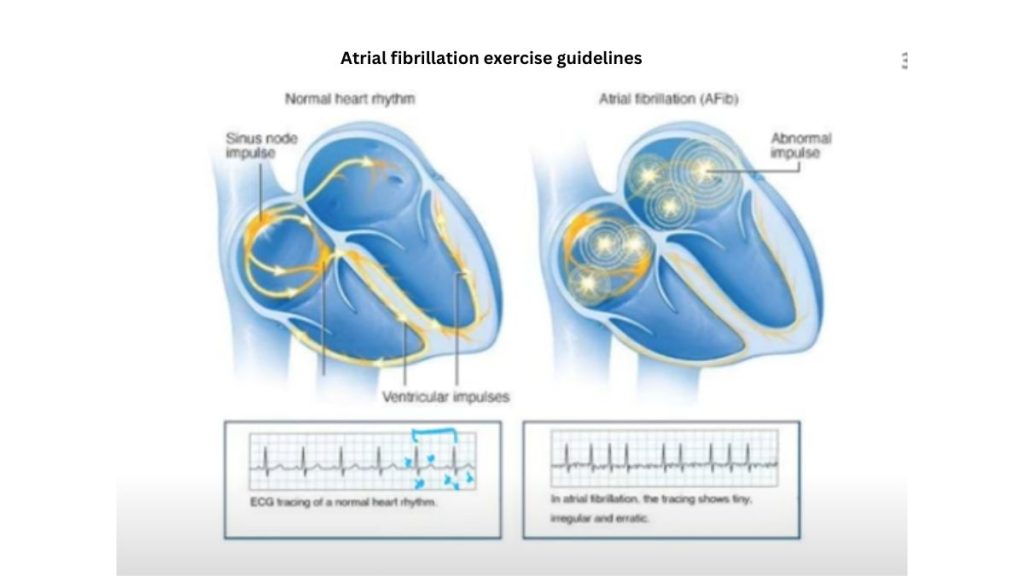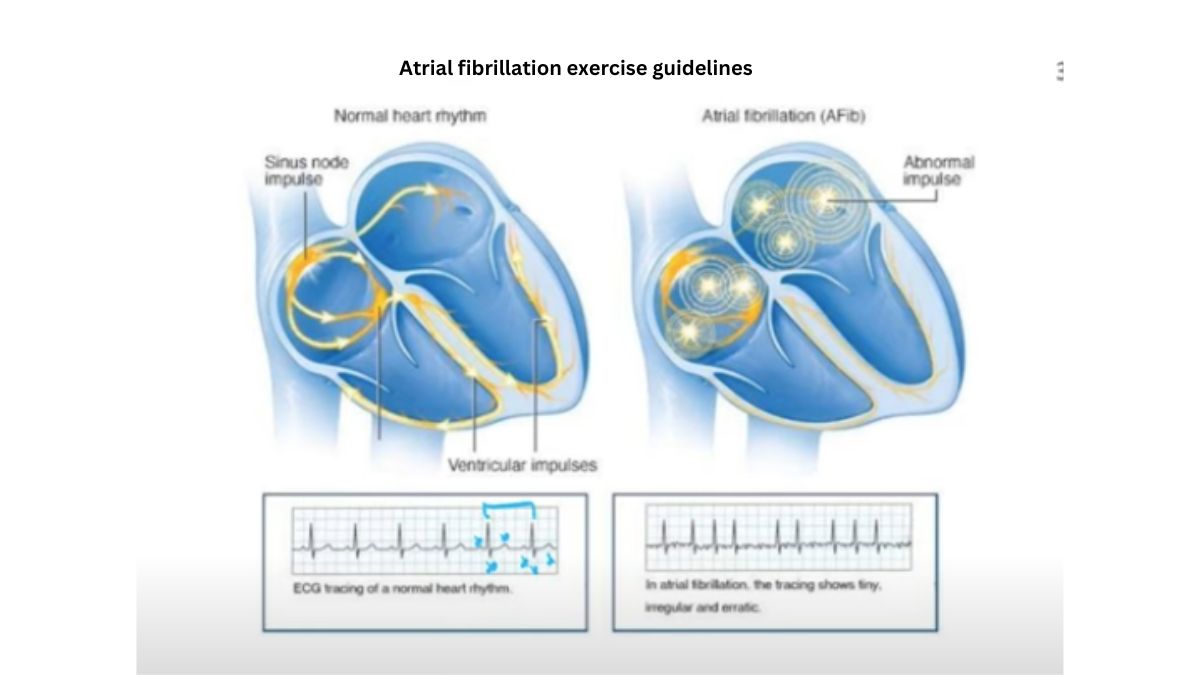Atrial fibrillation exercise guidelines:
Atrial fibrillation is a cardiac disease/ heart condition which generates an irregular & unusually fast heart rate. Besides, when you are at rest, your heart rate should be regular and between 60 to 100 beats per minute. However, if you are facing Atrial fibrillation then you can be concerned about whether you can exercise or not! Your concern & confusion is extremely understandable. Relax! You don’t have to be concerned about whether you can exercise with Atrial fibrillation or not. Because it is completely safe to do exercise with atrial fibrillation & all you have to do is maintain some guidelines.
According to the most recent European Society of Cardiology paper on AF therapy, to avoid the onset or recurrence of AF, patients should be urged to engage in moderate-intensity exercise and maintain physical activity. Moreover, regular physical exercise is essential for the prevention of secondary heart disease.
How To Stop Muscle Cramps Fast in 2024
Anyway, this article aims to assure you that you can do exercise with atrial fibrillation & also Atrial fibrillation exercise guidelines.
The Atrial fibrillation exercise guidelines:
Exercise is good for your heart & doctors also suggest doing exercise for a better heart rate but in an appropriate way. For this reason, some simple & easy atrial fibrillation exercise guidelines are mentioned below:

Warm-up:
Whether you are affected by atrial fibrillation or a perfectly fine human being, before doing any exercise, warming up is a must! Try to do a 10-15 minutes warm up & gradually increase intensity. Do not change your intensity suddenly while exercising because this can make your heart rate fluctuate! It can be risky for you. Also, try some easy & light movements which will prepare you for the next part.
Aerobic:
You can do aerobic exercise with your atrial fibrillation. But for doing aerobic exercise you need to have a clearance from your physician. Try to do it regularly. Perform at least 30 minutes of aerobic exercise each day & don’t focus on your intensity. Also, use a large muscle group working together & your heart rate (HR) also respiration rate should rise as a result, but you should still be able to converse. You can do walking or biking or you can use an elliptical for aerobic exercise.There is a suggestion for you if you can’t do a straight 30-minute exercise. For that, you can try interval training.
How to do interval training? For interval training try an easy session to harder. First attempt walking at a comfortable pace at least for 3 minutes. Then gradually increase your speed for 1 minute. After that, go back to your comfortable pace for another 3 minutes & continue as long as you can.
Weight training:
Do you know you can do weight training with your atrial fibrillation? Just follow these few steps:
- Strive for a high rep count while using light weights for two to three days a week. Do one day at a time rather than two days in a row.
- Then start with 1 set of 10 reps for each muscle set. Such as legs, back, chest, shoulders & also arms.
- As tolerated, increase to 2 or 3 sets of 10 to 15 repetitions.
- Besides, you can do strength training after some form of aerobic warm-up.
- Don’t forget to breathe while strength training. Do not hold your breath!
Cool down:
Cooling down is as important as warming up. Cooling down should last for 10 minutes & it allows the heart rate to be less. A sudden stop of exercising can cause an unexpected drop in blood pressure since exercise demands on the heart are no longer met. To assist in returning your heart rate (HR) to resting levels, engage in mild movement.
Stretching:
Stretching is a very good movement before doing any exercises. Do some easy muscle stretches or a little walking for 10 minutes because it adjusts your heart for the activity. Keep yourself hydrated before any exercises.
Atrial fibrillation exercise guidelines will be incomplete without mentioning the precautions an atrial fibrillation needs to take.

Precautions before doing exercise:
The main takeaway from atrial fibrillation and exercise is that the physiological changes it causes can be very beneficial to your heart and self-esteem. As you have atrial fibrillation, before doing any exercises make sure to seek advice from your Cardiologist or Clinical Nurse Specialist. Because it will help you to understand whether you can perform the exercises or not. Besides, you should monitor your heart rate. If your heart rate becomes abnormal while exercising you need to consult with your cardiologist. Doing exercises you will become dehydrated. For this reason, you need to keep yourself hydrated otherwise you will face low blood pressure. However, if you have fluid restrictions then consult your specialist.
When should you consult with your specialist?
While doing exercises, you should be conscious of some symptoms. For example chest pain, rapid heart rate, unusual breathing difficulties, feeling lightheaded or dizzy & also anything you feel unusual. If you face any of these while exercising then immediately consult with your specialist.
Wrap up:
Doing exercise is good for overall health. If you are facing atrial fibrillation you don’t need to worry about your exercise because it is completely safe. Just consult with your specialist & follow the mentioned atrial fibrillation exercise guidelines. Lastly, keep in mind that, don’t be hard on yourself, try to do moderate intense exercise. Also, have confidence in yourself as morale can reduce your 99% of diseases.
FAQ:
1.Which exercise needs to be avoided for atrial fibrillation?
Answer: Don’t start with high-intensity exercise & avoid doing skiing, outdoor biking, or any other heavy exercises.
2. What are the side effects of doing exercise while you have atrial fibrillation?
Answer: Some side effects you may face while doing exercise while you have atrial fibrillation. Such as dizziness, heart palpitations, sweating, shortness of breath, and anxiety.
3. Will any medicine interfere with exercising?
Answer: Some medicines may interrupt your exercise. Because some medicines can make you feel dizzy & you don’t need to be concerned about that. But still, you can consult with your doctor if you have any confusion.
4.How to monitor your heart rate?
Answer: You can calculate your maximum heart rate by deducting your age from 220.
